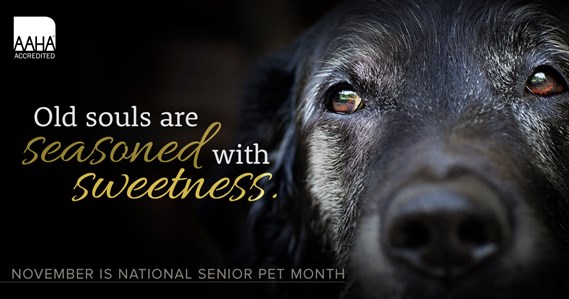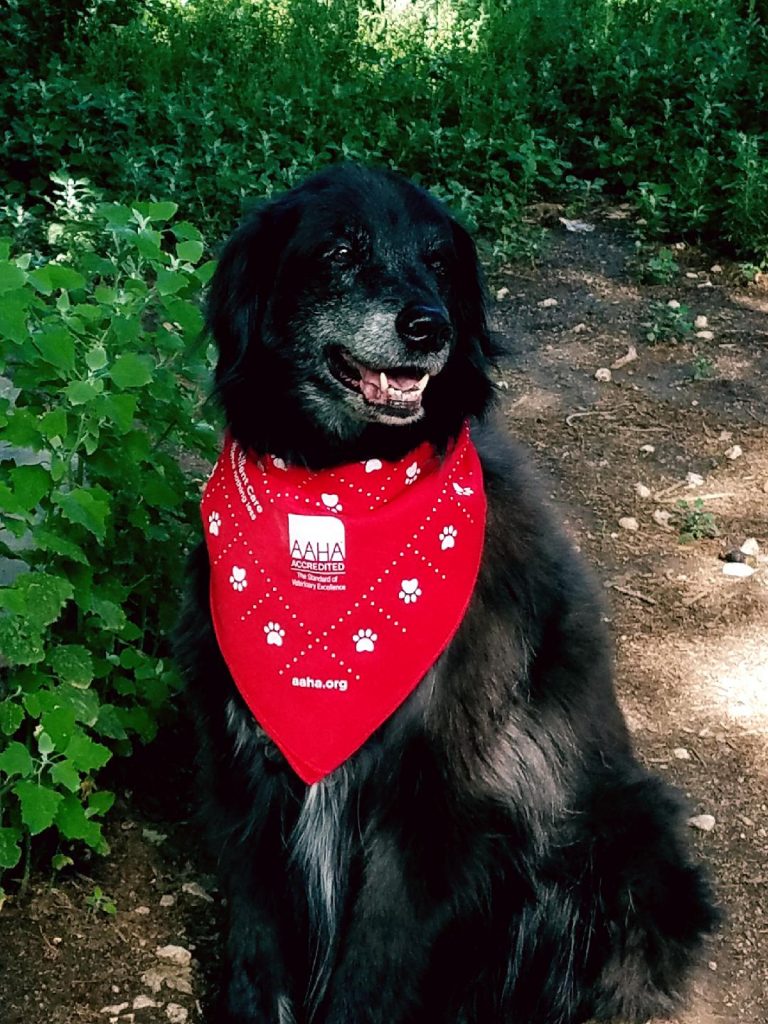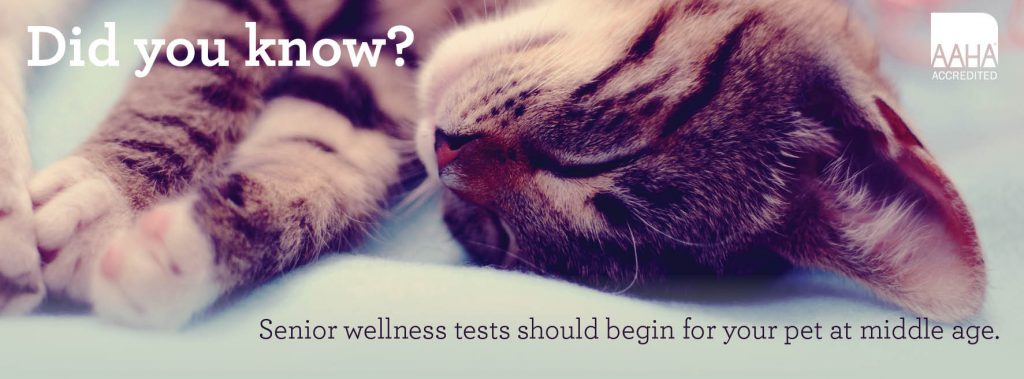
We want to help you celebrate your pet’s Golden years! The health of your pet can change quickly as he or she ages and these subtle changes often go unnoticed. Early detection and intervention leads to a lifetime of good health. Once your dog turns 7 years of age or your cat turns 8 years of age, we recommend that they undergo a thorough senior wellness exam and diagnostic work-up.
Even though you may believe your pet is normal, there are many disease processes that do not show any outward sign until the disease is quite advanced. More advanced diseases can be more difficult to treat and are not always as responsive to treatment as conditions diagnosed early. Early detection and monitoring of problems such as kidney disease, liver failure, thyroid disease, etc. will allow us to administer the appropriate treatments to help extend your pet’s life. We have a special senior citizen package whereby we offer our clients a complete Geriatric Work-up which includes; a thorough general physical examination, complete blood count, diagnostic health panel, electrolyte panel, urinalysis and thyroid hormone test. Many symptoms that historically have been attributed to old age and considered untreatable are now treatable and nutritionally manageable. For example, some dogs that appear to have lost their mental alertness (Cognitive Dysfunction) can be returned to a mental status indicative of a younger age using appropriate therapy and diet. Please feel free to contact us to discuss our senior wellness program in more detail.
 These are the same guidelines set out by the American Animal Hospital Association, the American Veterinary Medical Association, the Canadian Veterinary Medical Association and many other veterinary and animal health organizations.
These are the same guidelines set out by the American Animal Hospital Association, the American Veterinary Medical Association, the Canadian Veterinary Medical Association and many other veterinary and animal health organizations.
Senior Wellness Blood and Urine Testing
Just as annual blood and urine testing in our younger pets detects hidden concerns and trending health problems, so do these tests in our senior pets. The tests we choose for our senior pets are specifically designed to screen for the common problems that occur as they get older. It is ideal to check these values at each senior wellness visit since changes occur more rapidly in pets. Our geriatric wellness blood testing is a complete comprehensive lab blood test that includes a urine test which screens for early detection of many common organ failure problems in pets.
Nutritional Counselling
As pets age, their nutritional needs change. Due to often reduced activity, most mature pets require fewer calories. Lower levels of certain nutrients, including sodium, and phosphorus, can help a mature pet maintain a healthy cardiovascular system, urinary system and healthy kidneys. Since the aging digestive system does not absorb food as well, it is important to increase the intake of certain vitamins. Increases of other nutrients, such as essential fatty acids and certain minerals, help your pet maintain healthy skin and coat. Unfortunately, most ordinary pet foods do not take into account the special nutritional needs of your mature pet. Nutritional evaluation and advice is provided with each visit to determine your pet’s specific needs. Many of our veterinary diets provide superior nutrition with extensive research to support their benefits. They also are often used therapeutically in the prevention and treatment of many diseases as a pet ages such as arthritis, heart disease, liver disease, kidney disease and dental disease to name a few. Consequently your pet receives a food that tastes great, provides excellent nutrition and benefits their health.
Behavioral Counselling
As cats and dogs age, it is common to see changes in their behavior. Decreased hearing, sight and smell in addition to chronic painful disorders such as arthritis and dental disease can sometimes cause pets to become less interactive and sometimes more irritable. Another problem that can occur with aging of their brain is Cognitive Dysfunction. This is a disease similar to Alzheimer’s disease in people. Gradual changes may be noticed such as signs of confusion and forgetfulness, inappropriate house soiling, changes in interactions with owners to name a few. Medications and special diets formulated for cognitive dysfunction have tremendously improved the treatment of this aging change in pets.
Senior Pet Dental Disease
In our older pets, good dental care becomes even more important since the dental disease present also affects the internal health of the senior cats and dogs. Gingivitis and periodontal disease cause chronic inflammation which can be associated with problems in organs such as the liver, kidneys and heart. In patients already compromised in organ function or immune systems, these added stresses can be potentially dangerous. Some pet parents fear having their pet undergo dental treatments in their aging years because of the use of anesthesia. Remember age itself is not a disease and pets live healthier, longer, pain-free lives when dental disease is addressed and treated early. At our AAHA certified hospital we customize anesthetics used in our senior individuals based on their specific health needs, perform preanesthetic blood tests and presurgical physical examinations, and administer intravenous fluids and careful monitoring all of which reduce risks associated with anesthesia.
Additional Testing and Monitoring of Senior Pets
Additional diagnostic testing such as more extensive blood evaluation, radiographs, electrocardiograms, blood pressure and ultrasound are sometimes necessary to evaluate and monitor the health of your senior pet. Our veterinarians will recommend what diagnostic test may benefit your pet based on their comprehensive physical examinations and wellness blood tests. Routine testing for intestinal parasites and heartworm testing in dogs will also continue into their senior years with appropriate immunizations and prevention medications administered based on your pet’s individual needs.
Seven Tips to Enhance Your Aging Dog’s Longevity
1. Keep your dog trim
Keep your dog at a slim, trim body weight. Obesity dramatically contributes to ever so many age-related, debilitating issues such as arthritis (a huge problem for way too many dogs), diabetes and heart disease. Feed your dog as little as it takes to maintain an ideal body condition score. Remember, in general, older dogs require approximately 30 percent fewer calories to maintain a healthy body weight. If your dog is overweight, ask your veterinarian to help you devise a plan to tackle this problem.
2. Feed your dog a complete diet
Speaking of feeding your dog, be sure to choose diets that are:
- Nutritionally complete an properly balanced
- Of very high quality digestible nutrients
- Appropriate for your dog’s stage of life
Once you have a senior citizen on your hands, a diet that is higher in fiber and less calorically dense is usually the best choice. Multiple small meals may be better suited to your dog than feeding a larger meal once daily.
3. Exercise with your dog
Get out there and exercise with your dog! Not only will exercise help burn calories, it will strengthen muscles, enhance circulation and improve your dog’s heart and brain function. The activity you choose should be appropriate for your dog’s level of strength and stamina. No weekend warriors allowed. Shorter, more frequent walks may be better than going for a five-mile run. Gradually build up the duration and exertion of your dog’s activity level.
4. Keep your dog pain free
Speaking of exercise, be sure to take the steps necessary to allow your dog to be active. If arthritis pain is getting in the way, work with your veterinarian to find the right combination of remedies to allow your dog to be comfortable enough to exercise. There are a myriad of treatment modalities to choose from:
- Acupuncture
- Massage
- Underwater treadmill therapy
- Supplements
- Anti-inflammatory medications
The list goes on and on. Inactivity promotes a downhill cascade of events that is just about guaranteed to negatively impact your dog’s longevity. Do what it takes to keep your favorite pooch from becoming a couch potato.
5. Consider the changes your dog is going through
As your aged dog experiences loss of hearing and/or vision, leash walks and closer supervision become a necessity. Prevent your canine senior citizen from encountering physical harm because of changes. Teaching hand signals at an early age will pay off as your dog begins to experience age-related hearing loss. Doublecheck the whereabouts of your older dog before pulling into, or backing out of your driveway. Older dogs are less agile. Add to this deeper sleep and diminished hearing or vision and, without extra caution, a driveway tragedy can happen. (Unfortunately, such tragic accidents occur all too often.) Whereas youngsters can recover from broken body parts lickety split, such is not the case for older dogs.
6. Act fast when your dog seems sick
Act sooner rather than later when your dog isn’t feeling well. Compared to young and middle-aged dogs, seniors have less physical reserve and are more prone to becoming compromised following a spate of symptoms, including:
Whereas a 24-hour “wait and watch” approach might be reasonable for the youngster with such symptoms, waiting this long with an older dog before contacting your veterinarian may have dire consequences.
7. Schedule more regular checkups with your veterinarian
Even if you think your dog is perfectly healthy. Once a year is ideal for young and middle aged dogs. Switch to twice yearly exams for seniors. A head to toe physical examination, discussing how your dog is faring, and blood and urine testing (particularly if your dog is elderly) will allow your veterinarian to detect abnormalities early, prevent minor issues from becoming major issues, and outline a preventive health care plan for your beloved best friend.
Adapted from Pet Health Network


